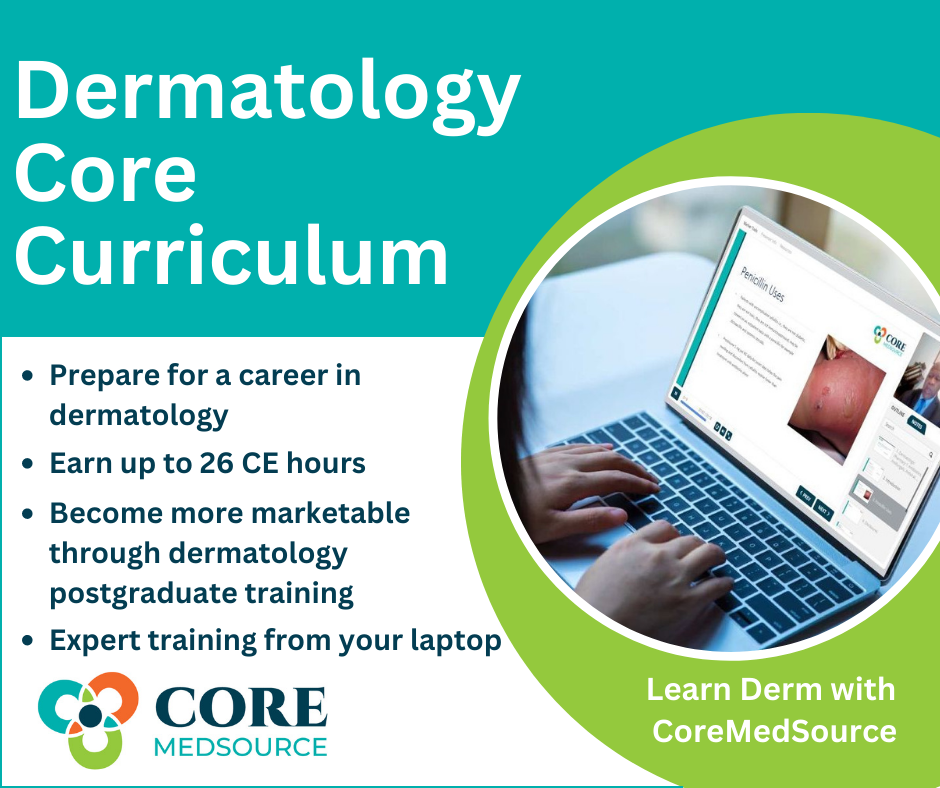CoreMedSource Provides Comprehensive Dermatology Training Online
The wildly popular Dermatology Core Curriculum program from CoreMedSource is the most comprehensive online course available, providing real-world clinical knowledge to help prepare you for a career in dermatology and provide confidence for clinical dermatology practice. George Cohen, MD, CoreMedSource Physician Director for Disparities and Diversity, Dermatology, and Pharmacology has dedicated his career to academic dermatology and instructs and leads the course, offering expertise and knowledge from his 40+ years practicing and training the next generation of dermatologists. CEO of CoreMedSource, Dr. Debra Shelby, PhD, DNP, is thrilled to have Dr. Cohen as part of the CoreMedSource team, “Dr. Cohen is one of the most respected dermatologists in the country and we are extremely grateful to have him as our program director for Dermatology.”
We asked Dr. Cohen about the Dermatology Core Curriculum program and what students will gain from the online dermatology training course.
For a practitioner wondering how to get training to work in Dermatology, can you tell us some of the things they should be looking for and how this course will help prepare them?
Dr. Cohen: Dermatology is a medical discipline that transcends all age groups, all genders, all economic groups, etc. Everybody’s got skin, and skin problems are very common, and they vary from nuisances to life-threatening disorders. This course is designed to give providers skills to recognize skin diseases, to discern that which is life-threatening from that which is aggravating. It’s designed to help them learn what diagnostic steps to take, how to take a proper history, and what the therapeutic options are. There are treatment pearls embedded within the lectures, so people can avoid common mistakes, like under-treating, over-treating, not treating. And, the course does have a module on skin of color to highlight some of the differences, because many diseases have a unique presentation in different skin tones, and many diseases are found if not uniquely in skin of color, then certainly to a greater degree, like keloids for instance.
What sort of things does the course cover to help NPs or PAs working in, or desiring to work in dermatology, or NPs that plan to start an independent dermatology practice of their own?
Dr. Cohen: They’ll learn about the current medications used to treat dermatologic conditions as well as some of the physical modalities to treat dermatology, for example, light therapy, and things like that. They’ll learn how to monitor a patient who needs systemic therapy because sometimes the drugs themselves pose a danger. There’s inherent danger in using some of these medicines, and so people must be aware of that. And they must know which diseases require multidisciplinary approaches. So, regardless of where you work, you’ve got to be cognizant of how to make the correct diagnosis, how to order tests to confirm the diagnosis, what the pros and cons of therapy are and your choices, and also when you need help, and that’s crucial, because as time goes by NPs, PAs, and other providers will have increasing levels of independence, and in some states independent practices – and that’s only going to grow, and so PAs and NPs are going to need to have those skills, diagnostic and therapeutic skills because there’s not going to be a dermatologist around to ask, nor should there be.
Nurse Practitioners and Physician Assistants – more and more will be expected of them, and they must have good fundamentals, which is a good history, taking a good physical exam, good descriptions, and be able to make a differential diagnosis; it could be A, B, C, D, or E and be able to order tests to narrow that down. And be able to discuss treatment and refer when necessary.
Other than diagnosing and treating, what are some of the nuances of clinical practice that are important to understand?
Dr. Cohen: In addition to the basics, they must learn that there are social determinants of health, including education, income, race and ethnicity; long story short, your zip code determines, to a large degree, what type of healthcare you’re going to get. So, that means they need to be cognizant of the way skin disease presents in different ethnic groups. They need to understand something about the cost involved because if you have this wonderful treatment and it costs hundreds of dollars, or hundreds of thousands of dollars – and many of them cost more than that – and a person is uninsured or underinsured, it’s not going help them.
They must be aware of the need to establish a network of colleagues and be able to network and communicate with other providers. They need to learn how to describe what they see accurately, which is why we have the module on basic dermatology – this is a papule, this is a pustule, etc. – because you can’t refer a patient and say, “This is a really bad rash,” that’s not going to cut it. They need to know when to biopsy, the different types of biopsies etc. This course will give people the skills they need to make the correct diagnosis, discuss therapeutic options with the patient and refer when necessary, because the fact of the matter is, everybody’s not going to be comfortable with some of the big gun therapy. Everybody can and should be able to diagnose conditions, describe conditions, and know when to refer, because NPs and PAs aren’t going to be dealing with metastatic melanoma to the lymph nodes on their own. We need them to know, If I suspect melanoma, I need to do this type of biopsy; or, I need to shave; or, I need to excise; or, We’re going to need multidisciplinary help for this…
Will you be keeping the content current and updated?
Dr. Cohen: Dermatology, like most of medicine, is evolving rapidly now because of increased understanding of things at the molecular level, increase in use of AI to sort things out, increase awareness of the human genome and how genetics plays a role in disease expression and treatment – and so because things are changing rapidly, there will be updates to keep people abreast of the latest and the greatest – not every little nuance, but the paradigm-shifting developments will be included.
For more information on Dermatology Core Curriculum, please visit coremedsource.com/dermatology. CoreMedSource offers expert-developed online training in a flexible, web-based format that is engaging, comprehensive, and relevant to today’s healthcare needs.



